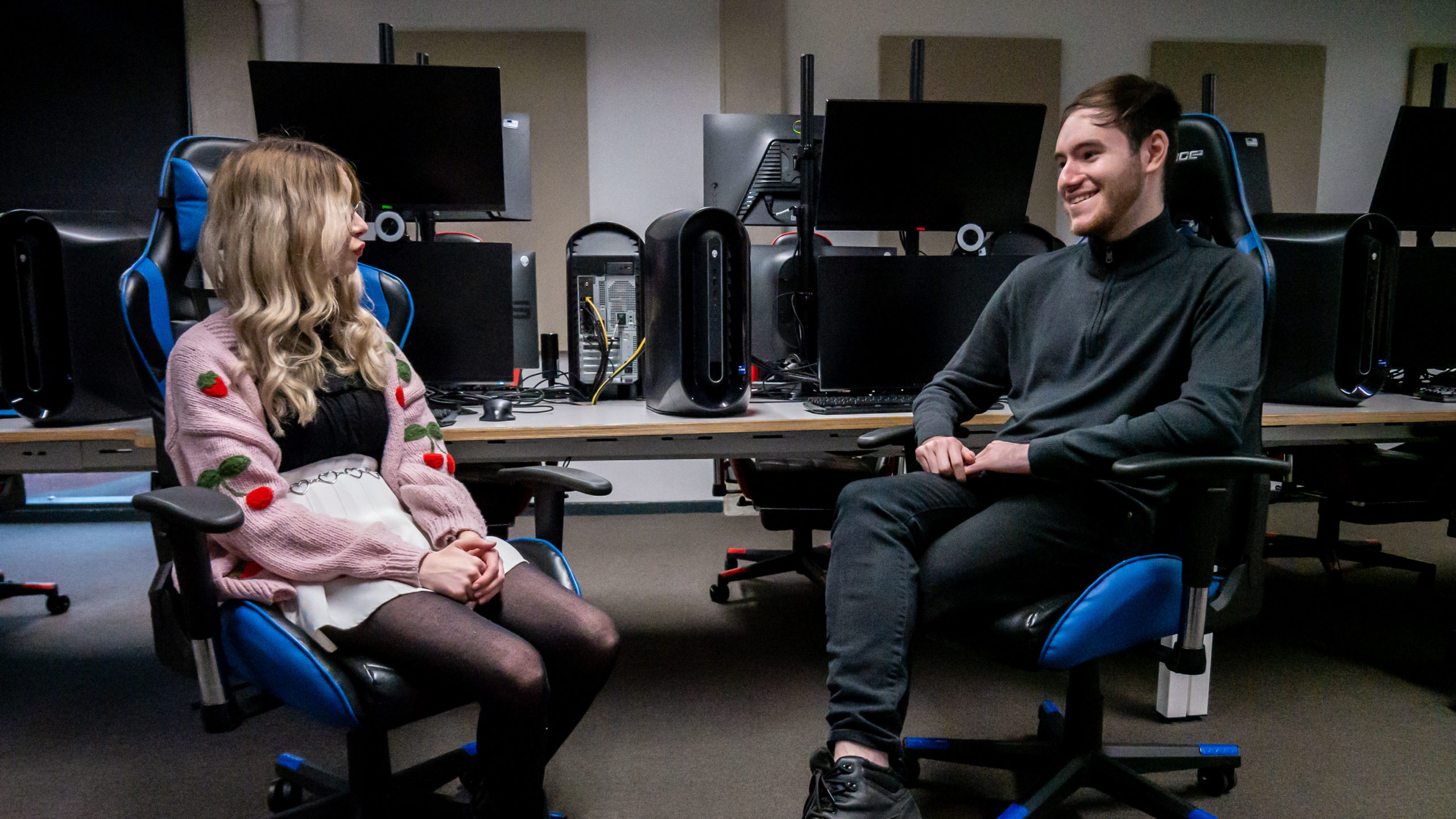
We sat down with third year Games Production degree students, Elizabeth and Saul, to find out about their experience studying at Confetti and what’s next for them after graduation.
The games industry is huge right now and growing at an impressive rate, so it should come as no surprise that more and more young people are flocking to study degrees in areas like Games Production, Games Art and Esports Production.
We wanted to find out more about what it’s like studying a subject in the gaming sector and where you can go once you’ve got that all important degree qualification, so we sat down with a couple of third year Games Production students to get their take on it. Saul and Elizabeth are edging towards the end of their studies right now and they are beginning to think about what comes next and how to get there. Read on to find out what they had to say:
What was one of your first experiences of video games?
Elizabeth:
“My first experience of video games was a mixture of playing on the Sega Dreamcast and sneaking onto my sisters Gameboy colour to play Pokémon crystal whenever they left the house, but never saving the progress. On Christmas Day when I was 7, my parents decided to gift me my first handheld console – a Nintendo DS which I still have to this day!”
Saul:
“So I don’t remember too much honestly! I had a Leap Frog console I used to play when I was quite young… I think it was called an Explorer! I eventually got a DS where I used to play Pokemon and Animal Crossing, and I used to do a lot of that with my older siblings which was really nice looking back on it. One day I eventually got given my older brother’s PS2 and that was it for me really, I loved playing on that! But it was mainly playing the DS with my siblings and friends which got me into games the most.”
Where were you and what were you doing when you realised you wanted to get into the Games Industry?
Elizabeth:
“I actually remember exactly where I was – after finishing college I knew I enjoyed 2D art, but it was not something I would like to do for a career. Soon after I started working at CEX, I was stocking shelves and saw the front cover of Overwatch. That was a breakthrough moment when I realised this was something I wanted to give my all.”
Saul:
“I was in primary school when I thought “oh it would be cool to test out games!” and I thought that for a while, but then I didn’t think that was realistic. Then when I got to picking my GCSE options…it could even have been nearer to my A-Levels, a teacher mentioned to me about doing Computer Science, and then I realised I could go into making games, which kinda got me started!”
Why do you think you became interested in studying Games Production at Confetti?
Elizabeth:
“I enjoy going to new spaces and as I had already attended college at Confetti that was my original plan, but after seeing what the production crew had been up to and all of the portfolio work, I decided to stay. I also managed to speak to a few Ambassadors on the open day – seeing that enthusiasm from the students influenced my decision. Nottingham is an area that facilitates creativity really well, it is a good space to be in.”
Saul:
“Well originally I was at the main NTU campus doing Computer Science with Games Programming (I think it was called that), but then one day I saw the Confetti Games Production course, I went to the open day, and everything about it just clicked with me. I am much more interested in doing practical work than theory and that’s what this course presented to me. Also, the tutors who I met on the open day, and the mentors at the time were all super personable and charismatic! Which was really nice to see, especially compared to some other open days I went on.
And also when I went about swapping my course to this, the Confetti team, and NTU were super helpful with it!”
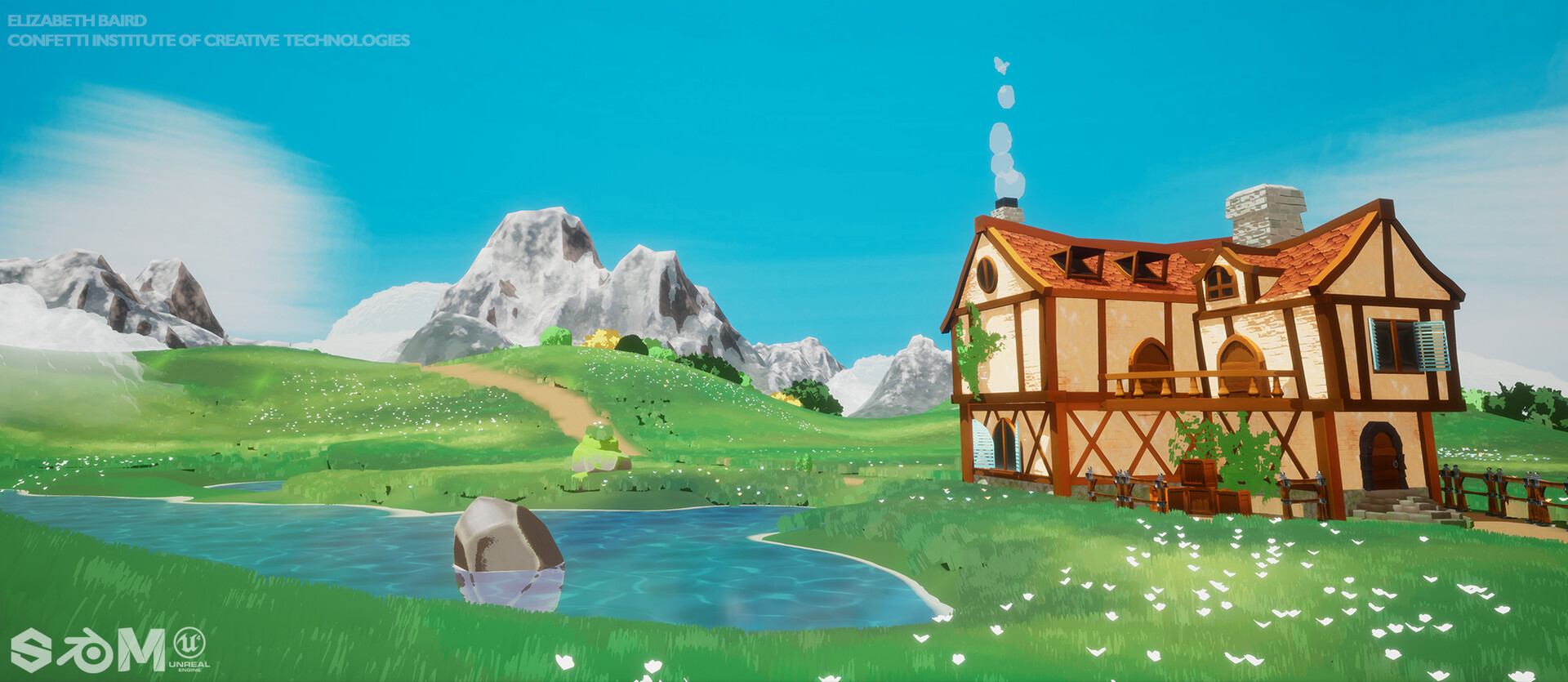
You recently got involved with some of the Grads in Games events, would you mind telling us about your experience with this? Did anything happen as a result?
Elizabeth:
“With the career connector event you would sign up and give your email plus a few companies that you’d like to work for. One of the choices I put was Airship Interactive, I spoke to team members, Daniel Hill and Jake Lamb, who were both lovely and also recent grads. We went over my portfolio structure, including what was strong, improvements, and where to cut back. It only took around 15 minutes in a super casual Discord call. Afterwards we connected via ArtStation and LinkedIn. They also went over the job-hunting process and gave their own experiences. Since then, I’ve shaped my portfolio and benefited from the experience as the feedback was based on how artistically I can improve.”
Saul:
“So I went to the Grads in Games career connector event, as well as a few talks, and the career connector event was great! I got to talk to companies such as Playtonic, 10:10 games and Red Kite Games. It was a great opportunity, I got to talk to them and see what they expect from potential recruits, and I got a lot of advice on how to interview and I applied for some of them too! I got an interview with one of them, which I think went well… I’m just waiting to hear back now.”
Presumably the majority of the skills you’ve learned from the course are to do specifically with Games Production, but have there been other areas outside this that you’ve developed that have helped you with your career path aspirations?
Elizabeth:
“Working part-time outside of university has helped improve my confidence, which has opened a lot of doors – I’d also say just getting involved with events both academic and hobby-related has helped me feel connected. On that note, picking up opportunities where you can is key – just getting involved has really helped me with networking and meeting new people.”
Saul:
“I think the course has definitely helped me improve my confidence and just my whole attitude has changed honestly. I’m using LinkedIn a lot more (everyone should use LinkedIn) and I am just trying to network and make friends in the industry, which I think has made me more confident in my speaking too.”
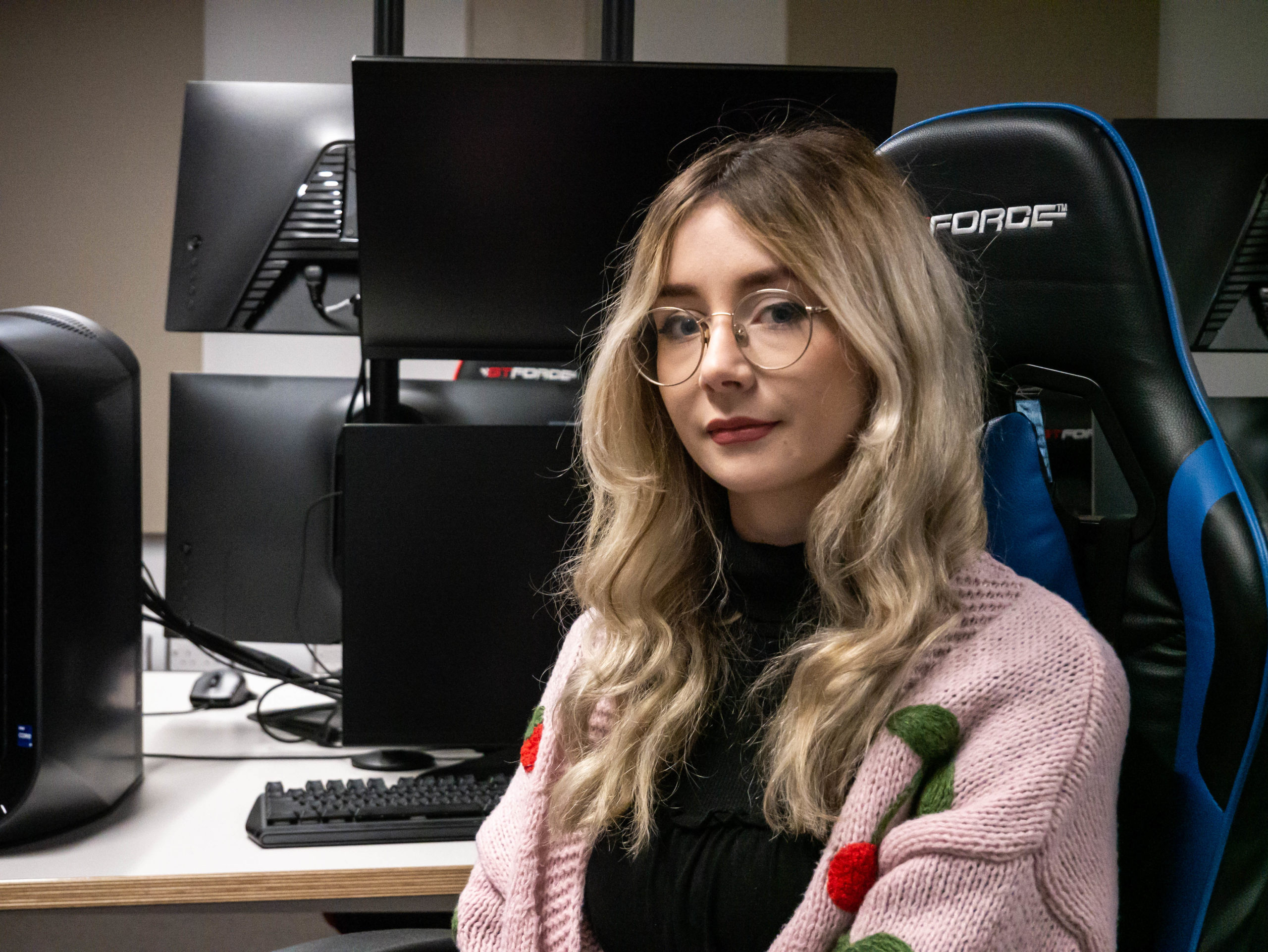
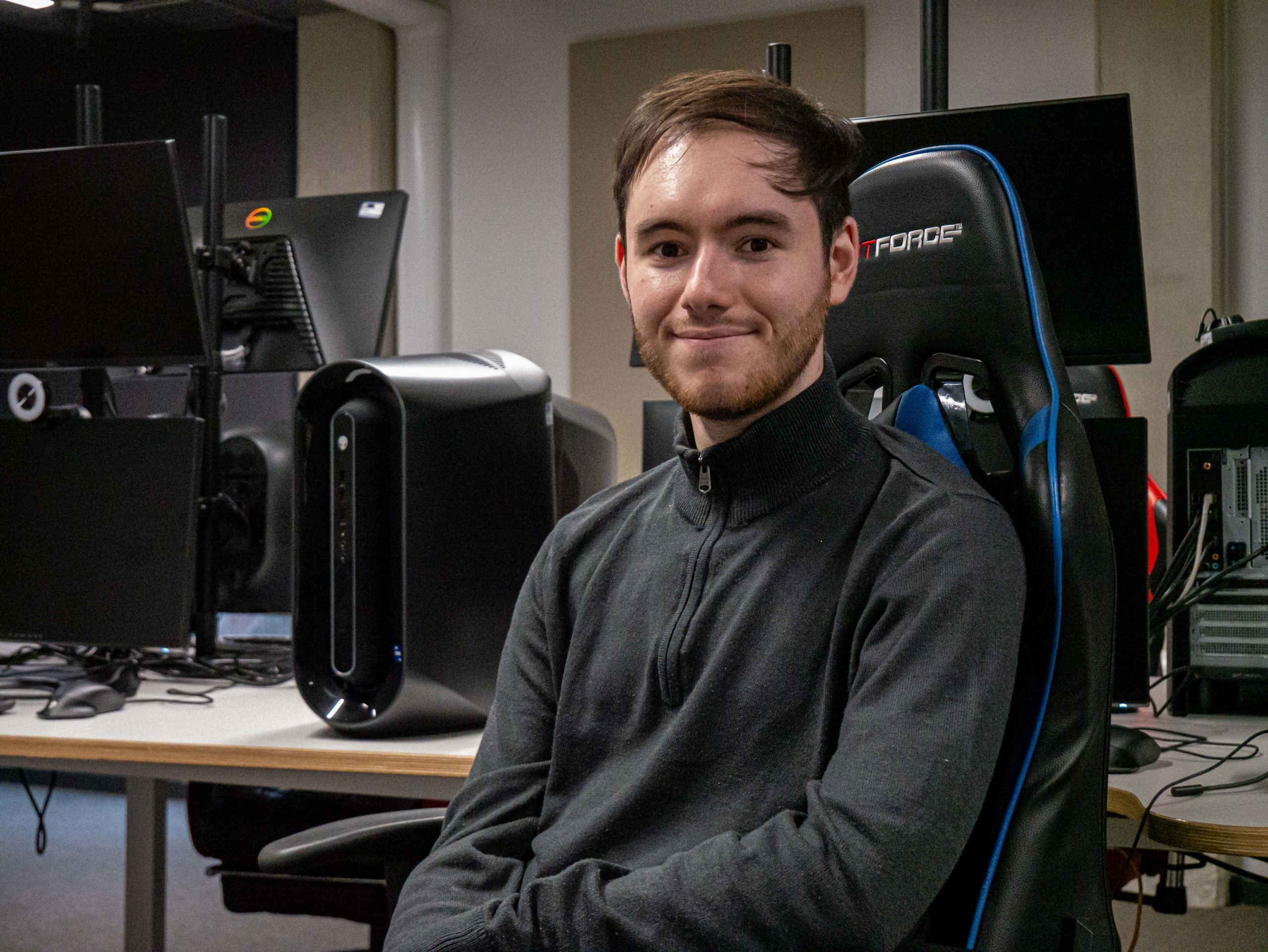
What advice would you give to other Confetti students or those thinking about joining us about getting into the Games Industry?
Elizabeth:
“It’s hard to say as a current student but know what you want out of university – the best advice I heard in year one was from Maggie Mojsiejuk during Industry Week who relayed the same message. If you want an internship in the second year? Game Jams? International volunteering? Timeline? When to build your portfolio? Setting out the map can make the next stages less daunting. I initially found out about a lot of organisations after attending an ‘Into Games’ event Confetti hosted – I’d recommend joining/checking out Into Games, Experience Points and the Grads in Games server if you are lost on where to start. If you create a space online for yourself where you can grow and connect as a Game Developer, it will also make getting involved easier, I tend to use Twitter. I also read a lot of breakdowns on 80.lv throughout projects – you can learn a lot about specific industry workflows there but finding a format that works for you is key.”
Saul:
“It’s a hard and complicated one, but know where you want to specialise. The course is 3 years (assuming you’re doing the BSc) and knowing where you want to specialise in those years will be extremely helpful as you can tailor your projects to that specific area. Plus when you leave the course and you start (maybe) looking for a job, knowing what you want to go into will mean your portfolio looks better and recruiters will know what you are all about. Also make a portfolio/artstation, share your work and use LinkedIn!”
Do you have a favourite memory or experience from your time at Confetti? This could be a guest lecture, a particular class or piece of software/equipment.
Elizabeth:
“I really enjoyed the ‘Sustainability Game Jam – as it was during lockdown restrictions were still in place, but the event felt very social and fun. I also enjoyed the Industry Week events and working open days as an Ambassador.”
Saul:
“Industry Week is honestly just a great time with Confetti, I thought our 1st year one was good – we gave feedback on how it could be better and then for me personally the one in 2nd year just knocked it out of the park! We had some great talks, the ones that stand out were from Sally Blake from Silent Games and Magdalena (Maggie!) who now works at Media Molecule! But we honestly had some fantastic talks which helped me when it came to making my job applications.”
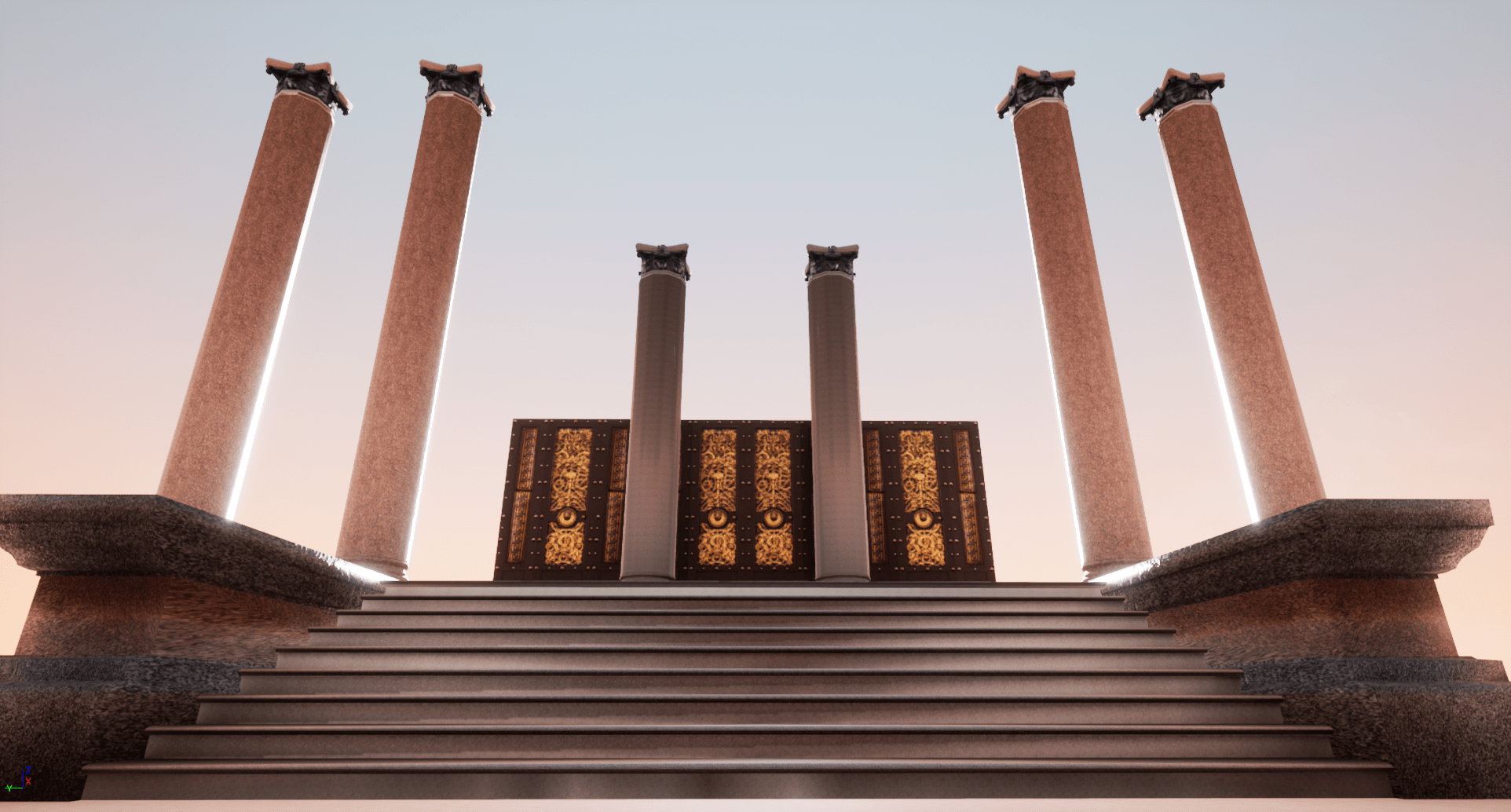
Is there anything you are working on right now, either externally or internally, that you want to let us know about?
Elizabeth:
“At the moment I’ve been keeping it minimal, but I am interested in doing one of Into Games weekly design brief workouts – I’m hoping to get involved with some more Game Jams this year with four on the horizon, so it’ll be that alongside university work till around the May period. A lot of it is just working towards portfolio pieces which I can use to apply for jobs as they crop up.”
Saul:
“As part of my final year project for Game Engines, I am making a game based on Hitman, partly because I love IOI as a company, so I thought this would be a piece to catch their eye and partly because…it’s quite fun! And partly because its a great opportunity to push myself honestly!”
“I do indie dev work as well (taking a small break from it due to deadlines) but yeah, that can be found on my Twitter which if people want to see more of they are welcome to follow me there! (@GamesBySaul)”
Can you give us any secret insights into what area(s) you want to find yourself in after your finish University this year?
Elizabeth:
“I’d love to go into stylized props and environments, there are a few studios I’ve been in touch with and some interesting parts in motion, but don’t want to say too much too soon!”
Saul:
“So, I am ideally looking to go into programming in the future, or tech design (kinda like the bridge between design and programming), and not because I haven’t specialised, more so because they both have quite similar requirements from what I’ve seen. But yeah, I ideally want to join a company, either in the UK or abroad (I wouldn’t mind moving somewhere), and start a career making games.”
Anything else you would like to add?
Elizabeth:
“It’s important to remember you’re only human – your work will go through fluctuations of quality and your aspirations will change which is 100% ok! It took me a long time to realise that and I only figured out what I’d like to specialise in four years after starting my first ever games-based course. If you keep trying, we’re all bound to succeed eventually.”
Saul:
“Anyone can reach out on Twitter or LinkedIn if they want to!”
Interested in studying a degree in Games Production with us?

